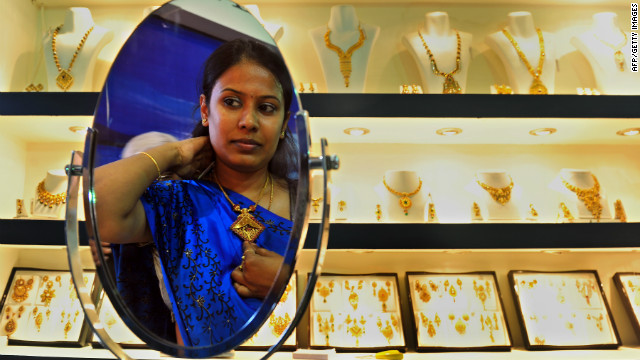By Mallika Kapur, CNN
Mumbai (CNN) -- In India, gold is gifted at weddings, when a baby is born, during festivals, to mark a promotion -- at any celebratory occasion. Walk into any gold shop, at any time of the year, and you are bound to find customers choosing a gold bracelet or biscuit. It's part and parcel of Indian culture.
In the heart of Mumbai's Jhaveri Bazaar, which translates into jewellery market, 24 year old Alfiya Bhombal shops for her wedding. She's come with her parents. The family will gift Alfiya and her groom gold at their wedding. Between trying on various necklaces and earrings, Bhombhal says "no bride will look the part without it."
Buying gold is a cultural habit in India -- one that's also driven by economics. More than half of India's population is unbanked. People who live in its villages are illiterate. Investing in a bank or a financial instrument is almost out of the question of this section of society. The easiest way to make an investment is to buy a piece of gold - a hard asset that can be stored at home. It gives good returns -- domestic gold prices rose around 13% last year.
There's one big problem with India's greed for gold. India doesn't produce any of the precious metal domestically. Everything that's consumed here, is imported. Just last year, that cost India $56 billion dollars -- and is one of the main reasons behind India's fiscal deficit ballooning. It touched a record high of 5.4% of India's gross domestic product in the July to September quarter last year.
That data had India's Finance Minister worried. In January, P Chidambaram said, "we may be left with no choice but to make it a little bit more expensive to import gold." He then raised the import duty on gold and platinum from 4 to 6% in an effort to curb demand.
Mohit Kamboj, President of the Bombay Bullion Association says he does not think this hike in gold import duty will affect a consumers appetite for gold, even if it means a gold bracelet may cost a little bit more. He said property prices have been hit by recession, the stock market hasn't given good returns. "No one has got much return on investment besides gold."
Investing in gold has been good for the retailer but according to Shubhada Rao, Chief Economist of Yes Bank, it's been a drag on the Indian economy. "Because savings have gone into gold, the financial savings have begun to deplete and that has caused structural liquidity in the banks to get lower," she said.
Across stores in India, it doesn't change much. Jewellery shops remain bustling and Bhombhal, unbothered by the government's decision to raise the import duty on gold. Buying gold is a centuries old tradition in India, one that few -- including Bhombhal -- are willing to give up.
source
please give me comments thanks
Mumbai (CNN) -- In India, gold is gifted at weddings, when a baby is born, during festivals, to mark a promotion -- at any celebratory occasion. Walk into any gold shop, at any time of the year, and you are bound to find customers choosing a gold bracelet or biscuit. It's part and parcel of Indian culture.
In the heart of Mumbai's Jhaveri Bazaar, which translates into jewellery market, 24 year old Alfiya Bhombal shops for her wedding. She's come with her parents. The family will gift Alfiya and her groom gold at their wedding. Between trying on various necklaces and earrings, Bhombhal says "no bride will look the part without it."
Buying gold is a cultural habit in India -- one that's also driven by economics. More than half of India's population is unbanked. People who live in its villages are illiterate. Investing in a bank or a financial instrument is almost out of the question of this section of society. The easiest way to make an investment is to buy a piece of gold - a hard asset that can be stored at home. It gives good returns -- domestic gold prices rose around 13% last year.
There's one big problem with India's greed for gold. India doesn't produce any of the precious metal domestically. Everything that's consumed here, is imported. Just last year, that cost India $56 billion dollars -- and is one of the main reasons behind India's fiscal deficit ballooning. It touched a record high of 5.4% of India's gross domestic product in the July to September quarter last year.
That data had India's Finance Minister worried. In January, P Chidambaram said, "we may be left with no choice but to make it a little bit more expensive to import gold." He then raised the import duty on gold and platinum from 4 to 6% in an effort to curb demand.
Mohit Kamboj, President of the Bombay Bullion Association says he does not think this hike in gold import duty will affect a consumers appetite for gold, even if it means a gold bracelet may cost a little bit more. He said property prices have been hit by recession, the stock market hasn't given good returns. "No one has got much return on investment besides gold."
Investing in gold has been good for the retailer but according to Shubhada Rao, Chief Economist of Yes Bank, it's been a drag on the Indian economy. "Because savings have gone into gold, the financial savings have begun to deplete and that has caused structural liquidity in the banks to get lower," she said.
Across stores in India, it doesn't change much. Jewellery shops remain bustling and Bhombhal, unbothered by the government's decision to raise the import duty on gold. Buying gold is a centuries old tradition in India, one that few -- including Bhombhal -- are willing to give up.
source
please give me comments thanks


 9:46 PM
9:46 PM
 admin
admin





0 comments:
Post a Comment